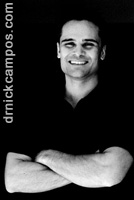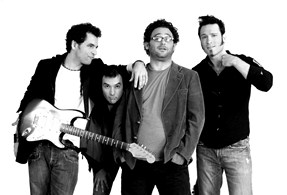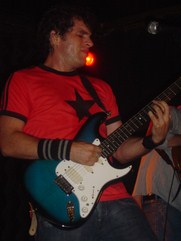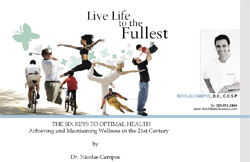
Many of you guys don't know this but I'm a rocker from way back. That's right. Rock and roll's in my blood. I was in a band back in high school. Maybe you'd heard of us – Rotten Core? Out of San Francisco? O.k. probably not. But, like I said, rock and roll's in my blood.
That's why I was thrilled to do my latest interview. As you know, I conduct interviews with people who are living the life of their dreams. I want to know how they do it, and I want to know what role their health plays in achieving their dreams, because I believe that health is our number one asset. I know that whatever you do, you'll do it much better when you're healthy and functioning properly.
So this month I interviewed rock and roll superstar Mark Latham of Latham Rocks. Mark is a high energy, musical dynamo, and if you enjoy going out to live shows, then you shouldn't miss his. You absolutely must check out his website at www.lathamrocks.com.

I love doing interviews because I think that people learn or get insights from others. Just listening to how someone else cares for his or her health can open up doors that you didn't even know existed. It can give you ideas or enhance what you're already doing to care for your most precious asset. On that note, I am pleased to present Mark Latham of Latham Rocks:
Dr. Campos: So, you're in the music business? This question may sound a little absurd but how important is your health in your line of work?
Mark Latham: Well first of all I will say that, as ridiculous as this sounds, you kind of have to look good on stage. That's not true for everybody, but I think it's generally true, especially in this image oriented city that we live in. And also, for me, it's about endurance – I do a high energy show – not to mention that I have to somewhat keep up my abdominals because that's a lot of how the air gets out of your lungs. If you are singing correctly, you're using a lot of your abdominal muscles.

DC: You sing and play the guitar?
ML: Yes – I also play bass, drums, and piano.
DC: Is there a difference among playing all those instruments and singing as far as being in shape?
ML: Most drummers are in shape. I think that takes the most out of you. You are using every limb. I probably drum incorrectly, so I get pretty tired if I'm drumming for a long time. Piano, not so much, I don't think, because you're sitting down, for one…unless you are Jerry Lee Lewis or Billy Joel, you don't really run around on stage as a piano player. And as a guitar player, it really just depends on what kind of a player you are. You can just stand there or you can run around the stage like me.
DC: Have you had special training for what you do? Did you have to learn breathing techniques?
ML: I took vocal lessons for about three weeks. And I think I got the wrong teacher because she was very stage oriented – meaning theater – so her style kind of conflicted with the way I sing. I have this kind of raspy, two-toned thing that I do – which is very hard to sing correctly, and sing for a theater person or an opera person.
DC: So you don't do any breathing techniques?
ML: No, I mean I do, but they're kind of self taught. I learned them from other places.
DC: What do you do? Tell me about them.
ML: If you're singing correctly, you can actually breathe in while you are singing out by correctly using your diaphragm. So a lot of times – especially on stage if I'm struggling vocally – I have to consciously remember to use my diaphragm. Cuz I can tend to overdo it.
DC: You ever get winded?
ML: Yes, I came close to passing out in New York once. We were on tour, and we'd been going and playing for seven, eight days straight and we got to New York and the way the show was set up, we wanted to play every song in our set, but we had a limited amount of time. So I said, “Well, let's just not have any breaks between songs”. We also played every song real fast. And some of my songs are rapid fire lyrics so when you're playing fast and you have no time to breathe you can get light headed. It wouldn't have been funny to pass out on stage.
DC: I've seen you play. You have a phenomenal band, incredible energy. How do you build up your energy before you go on stage?
ML: That's kind of a tough question because I don't rehearse the way I perform. I rehearse in a way to make the singing, the guitar playing, second nature, so that when I get up on stage I'm not thinking about that stuff. So no, I don't do anything special; I want it to be spontaneous; I want it to be brand new every time; I don't choreograph anything like that – I don't have any routines for that.
DC: Now, you've been a long time chiropractic client. How did you get turned on to chiropractic?
ML: You've heard the term “freshman 15”?
DC: No.
ML: You've never heard the term “freshman 15”? Didn't you go to college?
DC: I went to Berkeley – I don't remember half of it.
ML: Freshman 15 is the weight that a lot of people put on when they start college. I went to school in Boston, and I had this bad habit of going out and drinking at night. And if I didn't have a companion at the end of the night, I'd go out and get some food. The more I did that, the less I'd have a companion to go home with. So, I found myself in my mid-twenties trying to get back into shape, trying to lose weight, but also trying to do some things that I could do when I was in shape. So, I injured myself lifting weights. And it was one of those things…you know, like when you get injured, something happens, but you don't really feel pain yet? And I went out and ran on it. Woke up the next day feeling stiff as a board – I looked like a question mark. I was, like, completely crooked. I asked my uncle if I should see a doctor and he said, “Maybe you should try a chiropractor”. So I went to see a chiropractor…my first chiropractor wasn't really right for me. It took him about two months to get me back to normal. And then my back went out again, and this time I asked my step dad. He sent me to a different guy who fixed me in two days. And that's when I realized that chiropractic could really help you out, especially for that kind of thing. Since then, I've been doing it for maintenance. The injury is a blessing in disguise, because I can't go 10-14 days without working out, I start to have pain in my back, so, that's kind of a positive…it keeps me working out. Also, I go for chiropractic maintenance so I don't feel that pain again.
DC: Have you noticed anything else from receiving regular chiropractic care?
ML: I do forget this some times, but before I started seeing a chiropractor, I used to get a lot of headaches, and I don't get those any more.
DC: How do you keep in shape?
ML: I try to get to the gym two times per week and up to five times per week if I can do it.
DC: What's your workout routine like, and how important is it to what you do?
ML: The routine is very important, one for keeping my body able to hold adjustments. Ten days to two weeks without a workout, and I really feel the back again. Two, the cardio helps my endurance for performing. My routine basically consists of cardio machines...I try to switch it up daily, even different machines in the same workout to trick the body. I do weight training as well, and also try to mix it up once every week or two with a hike or a sport like tennis or Frisbee.
DC: What about your diet? Follow any specific dietary regimens?
ML: Like anything else, some days I'm much better than others, or at least I'm more disciplined.
DC: What would you consider more disciplined ?
ML: Disciplined to me has a lot to do with portion control and what you're putting in your body. If you eat McDonald's for breakfast, pizza for lunch, and then have a big bowl of rice for dinner, that's not going to be very good for you. And I've found for me, personally, that a lot of carbs adds weight to my body, so I try to keep an eye on that, which is unfortunate because carbs are fantastic in taste, you know.
DC: Do you do vitamins or anything like that?
ML: I do. I take a daily vitamin and a mineral at night, and also over the last year I have been taking something called Perfect Purples. I don't know if you've heard about that?
DC: No, I haven't. Is it LSD?
ML: No that was years ago – Perfect Purples is a powder that you mix in juice or water and it's basically supposed to cover your daily intake of fruits. Of course it can't possibly do that, but…it's a phytonutrients kind of thing.
DC: Oh sure, sure…how's it been?
ML: I definitely noticed a difference when I first started taking it. They pitch it as a healthy aging kind of thing, you know. Good for brain power, memory, skin, and a few other things.
DC: Usually with those powders that are fruit derived they are providing you with antioxidants which are very, very important, especially if you work out, or any time your respiration goes up, like when you're playing, that sort of thing, because you develop free radicals as your respiration increases. Antioxidants fight those. They're good stuff.
ML: It also helps to keep me regular…
DC: Oh yessss! (Chuckle, Chuckle) O.k.…. so listen, when I'm thinking rock and roll, I'm thinking orgies, I'm thinking sleepless night, I'm thinking heroin. But, you don't strike me as that type of guy, so what's your position on heavy partying?
ML: I've been there…but for me partying and rock and roll do not necessarily go hand in hand. What I mean by that is, I can't possibly be on stage in any way that's inebriating, because for me it's definitely about connecting with the audience, and the energy, and I want to give a full-on top performance every time, so I can't be doing that kind of thing to myself. Ironically, if I were in a touring band, I'd probably be the most sober that I can be, whereas people think of it as the other way around. And it used to be, but I think it's changed a lot. Partying is for when you get off tour.
DC: Yeah. I imagine you've come across a lot of musicians who are on that road. Do you see it affecting them?
ML: Oh yeah, I think one of the troubling things, especially about Los Angeles, is that a lot of people are here chasing fame, and I can tell you from personal experience that it's not easy to catch. And I definitely think that can turn people into a downward spiral. I think it's different for everybody – there are some people who can't control that sort thing (partying), and there are other people who can. You know, I'm one of those people who think that if you can control it, and you can still keep your life in order, then I don't have a problem with what anybody does. But I have definitely seen a lot of people who can't control it.
DC: How long have you been in the business?
ML: I have been playing in front of people for 20 years now.
DC: That's incredible – talk about longevity. You don't look a day over 25.
ML: Uh, that's what they tell me.
DC: Is that a state of mind?
ML: I do believe that – a lot of things are a state of mind. You said something interesting to me once that I've kept in my head. You said about John Elway, as soon as he retired from football, he aged like ten years, because he had no new goals. And I kind of respect that idea that if you are always looking forward to something, you'll keep your youth…but I do think that it's a state of mind and it's how you live your life. And I also think it has nothing to do with money because I've seen plenty of people who make a lot of money who age quickly.
DC: I think a lot of it has to do, too, with the fact that you are doing something you love…very important.
ML: I remember telling my uncle, who is the head of the economics department at Johns Hopkins University, that I'd be happier living in a studio apartment, playing my guitar everyday than I would be putting on a suit and tie, and going to work everyday, and having a house. The first time I put it to him like that he understood where I was coming from. Ironically, security is not what I need to be happy, personally…
DC: Umm hmm, yeah, yeah…you're following your dreams; you're doing what you love. So, you're an incredible musician, and a great songwriter, where do you get your inspiration? What inspires you?
ML: Song writing is an interesting thing because it's not a learnable skill. For me, a lot of time I'll be playing guitar and something I did catches my ear and I'll start going with that feeling, then something will come out of my mouth, usually a melody, and then I'll start saying a word or two that has something to do with the chorus. And I'll think, “That sounds cool, what does that mean to me?” And, when I decide what it means to me, I'll start telling the story. The funny thing about inspiration is that you can't force it. I can't tell you how many times I've had to get out of bed after falling asleep because a song has appeared in my head and I have to write it.
DC: Excellent; I love that. You mean there's no forced inspiration?
ML: No, I mean, I've gone six to eight weeks playing guitar every day and I've come up with crap. And, you know, one day I'll come up with five songs and be like, “where did that come from?”
DC: That's an excellent point, I'm glad you brought that up because inspiration does come sometimes when you're sleeping, or when you're meditating, and it's so important to write it down because otherwise it's lost. You can't ignore those moments of inspiration.
ML: I think a lot of people don't recognize inspiration as an opportunity. “Oh yeah, well, I gotta go mow the lawn right now”, whatever it is. But if something comes to you and you don't act on it right away…I mean, I've lost as many songs as I've written for exactly that reason.
DC: Do you have any outlets to relieve mental stress? Meditation, chanting, destroying guitars on stage, what do you do? How do you clear your pent-up stress?
ML: Well, I'm probably the most even-keeled person I know. But…the meditating…I've tried it, but I haven't been able to get regular with it. But it does help, not as much for stress but more for focus. If I spend some time in the morning just clearing my head, thinking about what I've got to do that day, I end up having a much more efficient day.
DC: So, you're saying you just focus on your activities…
ML: Yeah, just realizing what's important…I don't know, I just don't get stressed out. I don't know what to say.
DC: Hey, that's great. So what about sleep?
ML: I find sleep one of the most important and enjoyable parts of my life. I can get by on six hours of sleep but I prefer eight or nine. It might be something that helps with my aging, I don't know.
DC: I think it does, quite honestly…
ML: I'm a big fan of dreaming. Good times.
DC: Oh yeah? Tell me about it.
ML: Especially – and I'm sure you've experienced this – but, when you get up, and you don't have to do anything, so you go back to sleep – that's when your dreams are the most vivid; that's when they're most real and most enjoyable.
DC: Do you just enjoy them as, um…mental movies, or do you actually pull inspiration out of them.
ML: Both. Yeah, I mean it is similar to movies. A lot of times you're having your own adventure that you wouldn't necessarily have on a day to day basis. Sometimes you'll see people that have passed and maybe they have something to tell you. That's always interesting. It also gives me inspiration writing wise – ideas for stories, that kind of thing…
DC: So what's going on right now with your band, where can people see you in May?
ML: The Gig in Hollywood on May 15th. It's the Music Connection Magazine's Best Kept Secret Showcase. It's on Melrose. And then we've got the Viper Room on May 27th, which is the Sunday of Memorial day.
DC: And you've cut your second CD?
ML: Yeah it's called Sophomore .
DC: I've given out a copy to several of my clients. It's a great disc – I love it. O.k. let's close with a quick plug for chiropractic.
ML: A quick plug for chiropractic? O.k – If you've never tried chiropractic, and you have back pain, stop going to the doctor and asking for drugs. Chiropractic is a much better way to get yourself straightened out, on the go, and happy. I have to say, I don't think I could have ever realized the importance of my central nervous system, and actually have known what goes on with it, until I went to chiropractic. It's an education because once you've been straightened out you can actually feel when you're getting pinched. You really understand what that pain is, and where it's coming from.
DC: Thank you, man. Rock on.
Ah…artists. Gotta love ‘em. You see, we can all pull something out of a good conversation. Yes, I like Mark's style. He lives the life that he loves, and he does what it takes to keep on rocking. And without a doubt, I'm most impressed with Mark's connection to his spirit. He listens to his inspiration and he is open to receiving information through all means possible. Now that's what I find inspiring. Hope you all enjoyed that and I look forward to doing the next one. Will it be you? Keep rocking and keep focusing on your health – it pays!
-May 2, 2007
*COMING SOON
The Six Keys to Optimal Health by Dr. Nicolas Campos
For More Advice on Health and Optimal Living Read
“The Six Keys to Optimal Health” by Dr. Nicolas Campos
COMING SOON TO A BOOKSTORE NEAR YOU

| 
















